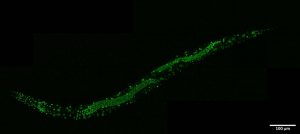Enter your address to receive notifications about new posts to your email.
Articles tagged C. elegans
(43 results)
-
Community Voices
Early Career Leadership Spotlight: Tammy Lee
We’re taking time to get to know the members of the GSA’s Early Career Scientist Committees. Join us to learn more about our early career scientist advocates. Tammy Lee Multimedia Subcommittee University of Toronto Research Interest How is genetic information that is stored in the germline passed on from one generation to the next? The germline…
-
New members of the GSA Board of Directors: 2023–2025
We are pleased to announce the election of five new leaders to the GSA Board of Directors: 2023 Vice President/2024 President Mariana Wolfner Distinguished Professor of Molecular Biology and Genetics and Stephen H. Weiss Presidential Fellow My research has focused on the genes and pathways that mediate sexual development and reproduction, primarily in Drosophila. From…
-
Early Career Leadership Spotlight: Kristen Navarro
We’re taking time to get to know the members of the GSA’s Early Career Scientist Committees. Join us to learn more about our early career scientist advocates. Kristen Navarro Communication and Outreach Subcommittee Ohio State University Research Interest My love of science did not initially come from a place of positivity or wonder. It came from…
-
Nerve cell organelle mystery
NUN bodies in C. elegans offer clues about nervous system differentiation. One of the most active areas of research today explores the differences between individual cell types and how cells become differentiated. This specialization of cell types relies on changes in gene expression, but how those changes are orchestrated remains unknown. Now, research published in…
-
Nested CRISPR for cloning-free fluorescent tags
A better way to make endogenous reporters in C. elegans CRISPR systems for gene editing have revolutionized biological research, but the method still has limitations. While it is usually straightforward to delete parts of the genome using CRISPR, large insertions can be a challenge. This has been the case even for the nematode Caenorhabditis elegans,…
-
Genetics Society of America Awards 2019 GSA Medal to Anne Villeneuve
The Genetics Society of America (GSA) is pleased to announce that Anne Villeneuve, PhD, of Stanford University is the recipient of the 2019 Genetics Society of America Medal. Villeneuve is recognized for her research on the mechanisms governing chromosome inheritance during sexual reproduction. Her research focuses on meiosis, the specialized cell division program involved in…
-
Undergraduate Travel Award winners — 22nd International C. elegans Conference
To promote excellence in undergraduate research and education, the Genetics Society of America has established a travel award to assist undergraduate members attending a GSA conference and presenting their research. We’re proud to announce the winners of the Undergraduate Travel Award! The recipients will be attending the 22nd International C. elegans Conference at UCLA from June 20–24, 2019. We can’t…
-
Building the basement
A suppressor screen in C. elegans uncovers previously unknown flexibility in the genetics underlying extracellular membranes. In nearly all animal tissues, thin barriers called basement membranes anchor outward-facing layers of cells—the linings of lungs, the top layers of skin, the insides of blood vessels—to the connective tissues that support them. Mutations disrupting any major basement…
-
ModERN treasure: hundreds of worm and fly transcription factor binding profiles cataloged
Offshoot of the modENCODE project provides crucial data and strains for understanding gene regulation. Following a multidisciplinary effort spanning six institutions, researchers working on the modERN (model organism Encyclopedia of Regulatory Networks) project have released a powerful resource for biologists studying the fruit fly Drosophila melanogaster and the nematode worm Caenorhabditis elegans. So far, report Kudron,…
-
Worm studies reveal cells on the move
Consider the papercut—a minor injury best known for the disproportionate amount of pain it can cause. That a wound so inconsequential can sting so terribly is curious, but perhaps even more surprising is the fact that it heals at all. To heal a wound, even one as trivial as a papercut, the cells involved in…
-
Hyper-conserved sperm proteins can still evolve rapidly
The fastest-evolving genes in eukaryotes commonly encode reproductive proteins—and the rate at which genes for male reproductive proteins change, in particular, often vastly outstrips the rate of change across the genome as a whole. A recent paper in G3: Genes|Genomes|Genetics describes an unusual exception: the amino acid sequences of the most abundant sperm proteins in…











